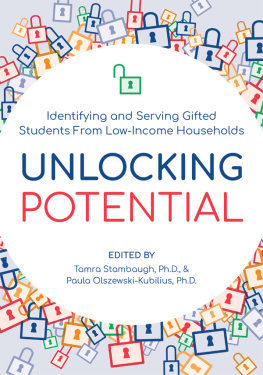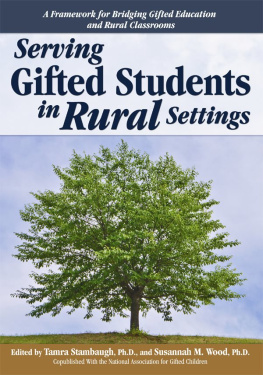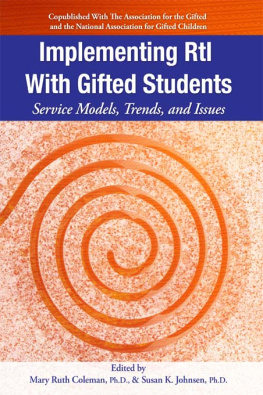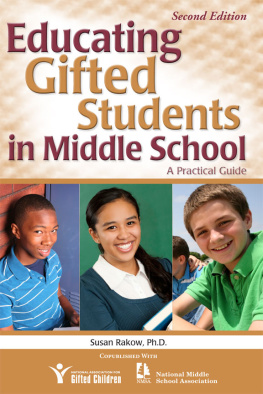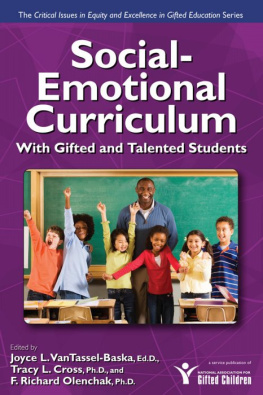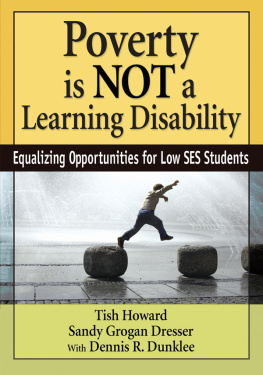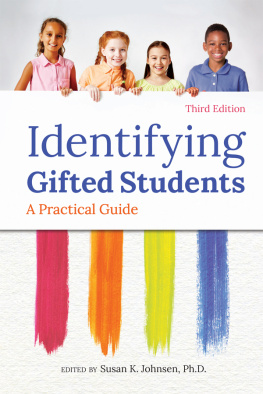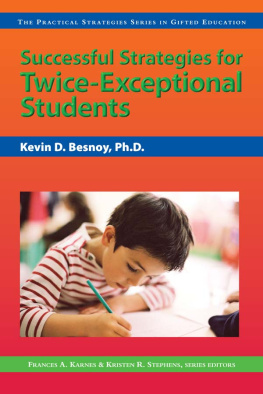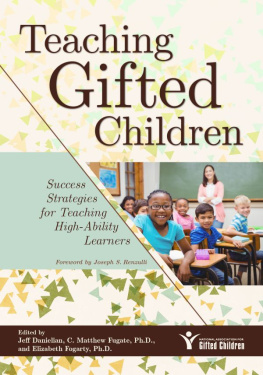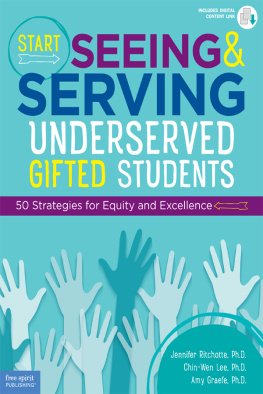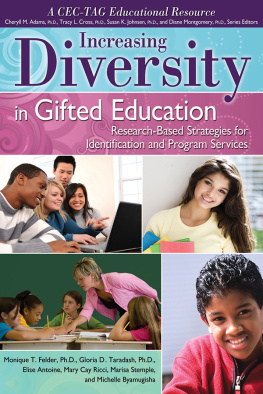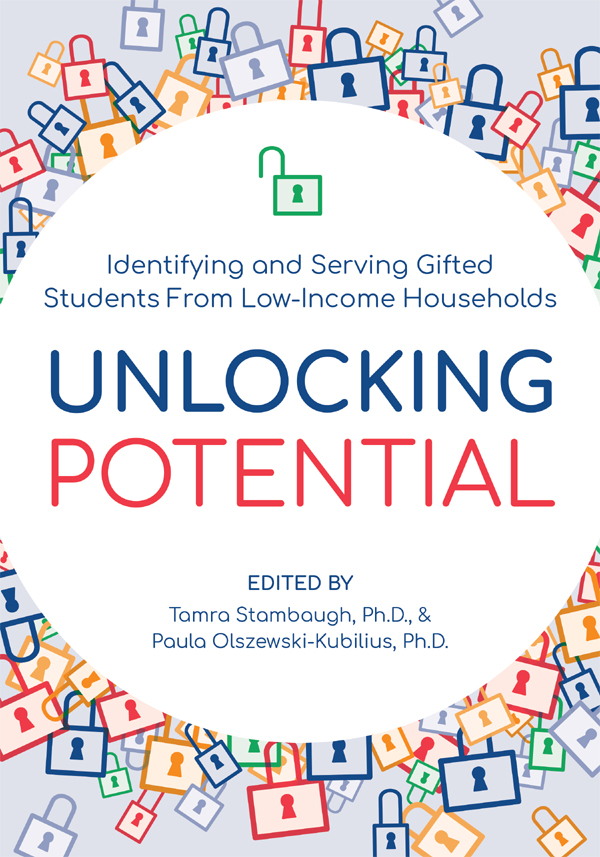


Library of Congress Cataloging-in-Publication Data
Names: Stambaugh, Tamra, editor. | Olszewski-Kubilius, Paula, editor.
Title: Unlocking potential : identifying and serving gifted students from low-income households / Tamra Stambaugh, Ph.D., and Paula Olszewski-Kubilius, Ph.D.
Description: Waco : Prufrock Press Inc., 2020. | Includes bibliographical references. | Summary: This edited book, written by authors with extensive experience in working with gifted students from low-income households, focuses on ways to translate the latest research and theory into evidence-supported practices that impact how schools identify and serve these students-- Provided by publisher.
Identifiers: LCCN 2020036321 (print) | LCCN 2020036322 (ebook) | ISBN 9781646320806 (Paperback) | ISBN 9781646320813 (eBook) | ISBN 9781646320820 (ePub)
Subjects: LCSH: Gifted children--Identification. | Gifted children--Education--United States. | Children with social disabilities--Education--United States.
Classification: LCC LC3993.2 .U57 2020 (print) | LCC LC3993.2 (ebook) | DDC 371.95--dc23
LC record available at https://lccn.loc.gov/2020036321
LC ebook record available at https://lccn.loc.gov/2020036322
Copyright 2020, Prufrock Press Inc.
Edited by Stephanie McCauley
Cover design by Allegra Denbo and layout design by Shelby Charette
ISBN-13: 978-1-64632-082-0
No part of this book may be reproduced, translated, stored in a retrieval system, or transmitted, in any form or by any means, electronic, mechanical, photocopying, microfilming, recording, or otherwise, without written permission from the publisher.
For more information about our copyright policy or to request reprint permissions, visit https://www.prufrock.com/permissions.aspx.
At the time of this books publication, all facts and figures cited are the most current available. All telephone numbers, addresses, and website URLs are accurate and active. All publications, organizations, websites, and other resources exist as described in the book, and all have been verified. The authors and Prufrock Press Inc. make no warranty or guarantee concerning the information and materials given out by organizations or content found at websites, and we are not responsible for any changes that occur after this books publication. If you find an error, please contact Prufrock Press Inc.

| Prufrock Press Inc.
P.O. Box 8813
Waco, TX 76714-8813
Phone: (800) 998-2208
Fax: (800) 240-0333
http://www.prufrock.com |
Table of Contents
Chapter 1
Poverty, Academic Achievement, and Giftedness: A Literature Review
Chapter 2
Intersections of Culture, Context, and Race With Poverty: Implications for Services for Gifted Learners From Low-Income Backgrounds
Chapter 3
Macro-Identification Approaches and Systems for Students From Low-Income Backgrounds
Chapter 4
Micro-Identification Processes
Chapter 5
A Curriculum Design Model for Students From Low-Income Households
Chapter 6
Instructional Strategies to Support Learners From Low-Income Backgrounds: The Humanities
Chapter 7
Instructional Strategies to Support Talented Students From Low-Income Households: The STEM Fields
Chapter 8
Effective Intervention Models to Support the Talent Development of Students From Low-Income Households Beyond the School Day
Chapter 9
Effective Strategies for Career Counseling of Gifted Learners From Low-Income Backgrounds
Chapter 10
Teaching Psychosocial Skills and Modeling Habits of Achievement
Chapter 11
Tapping Into Family Resources to Support Gifted Learners From Low-Income Backgrounds
Chapter 12
A Systems Approach to Identifying and Serving Gifted Learners From Low-Income Backgrounds
Chapter 13
Voices and Reflections
Foreword
This book on the implications of poverty for talent development offers important recommendations for educators and policymakers on what needs to occur in reforming gifted programs and services to reach students from low-income households more effectively. Chapters are very well-balanced in respect to the psychological issues and concepts that affect this population, as well as the educational issues that impact pathways to social mobility and life success. It is also a well-researched volume that draws on research across and beyond education, sharing insights from sociologists, psychologists, and economists whose work is critical to understanding the scope of the problem within the American educational system. Key stakeholder groups are acknowledged and addressed as potential barriers as well as facilitators of learning. These groups include parents, teachers, counselors, and the students themselves.
Translation of research into practice is emphasized in the book, especially in chapters that acknowledge the power of interventions of out-of-school programs and services, in-school curriculum interventions, and educational policies that promote acceleration and other modes of curriculum flexibility. Of particular interest is the focus on the long-term educational trajectories that track students from low-income backgrounds across early childhood, middle childhood, and secondary levels in respect to understanding the intersections of development, aptitudes, and individual differences. Concerns for university education also suggest that the development of these learners in the subtleties of both social and cognitive skill sets is crucial to negotiating ever more challenging environments that may lack the personal support students may have enjoyed earlier.
As a team, the editors of the volume bring a wealth of both research and practical expertise on the topic under study. Olszewski-Kubilius has almost 40 years of consistent and outstanding work in addressing the needs of students from low-income backgrounds through designing out-of-school program experiences and implementing a research program that provides answers to important questions related to these learners and their needs. Her longitudinal research to assess how these students perform beyond middle school and what the impacts are of specific interventions at earlier and later stages of development is groundbreaking and important for educators to understand in crafting successful interventions. Stambaughs record of achievement in working with these learners is equally impressive, especially at the level of sustained practice. Her work has traversed local, state, national, and university levels in addressing the problem for more than 30 years. She has worked diligently in developing curriculum and program services to meet the needs of these learners at precollegiate levels and has translated that work through professional development and materials for teachers and other educators.
Next page
